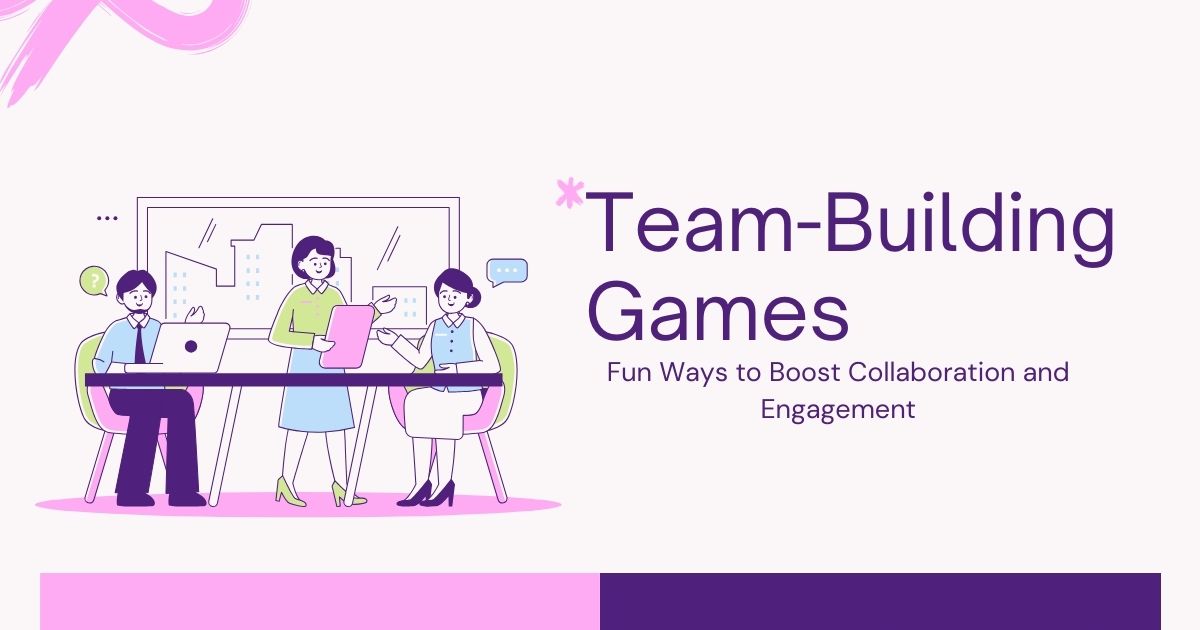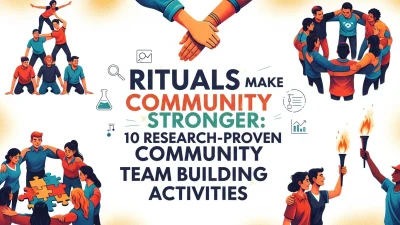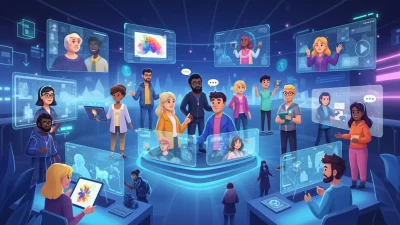Why Team Building Matters

Team building is far more than casual lunches, occasional retreats, or superficial icebreakers. At its core, it’s about fostering trust, alignment, and a shared sense of purpose across your organization. Team-building games are a powerful tool in this process, providing structured yet engaging ways for employees to collaborate, communicate, and solve problems together. By incorporating these games into regular workplace activities, organizations can break down silos, strengthen interpersonal relationships, and create a culture where employees feel connected and invested in collective goals. Beyond boosting morale, well-designed team-building games enhance productivity, encourage creativity, and lay the foundation for a resilient, high-performing workforce.
Key Benefits of Team Building Activities

Drives Productivity
Well-designed team-building games help employees work together more effectively, leading to faster problem-solving, better decision-making, and streamlined workflows. By engaging in collaborative challenges, teams learn how to leverage each member’s strengths, communicate efficiently, and tackle tasks with greater speed and accuracy. This improved cohesion directly translates into higher productivity across projects and departments. For additional insights on fostering collaboration, check out building shared community experiences.
Boosts Employee Morale
When employees participate in enjoyable and meaningful team-building games, it creates a positive work environment that nurtures motivation and engagement. Sharing experiences, celebrating small wins, and overcoming challenges together fosters a sense of belonging and camaraderie.
Strong emotional workplace connection is similar to relationship-based marketing approaches, such as those outlined in how sponsorships enhance relationship marketing.
Encourages Collaboration
Team-building games provide structured opportunities for employees to practice collaboration in low-pressure settings. These activities encourage open communication, active listening, and shared problem-solving, which helps teams navigate challenges more smoothly and prevent unnecessary conflict. Teams that regularly engage in these games develop stronger interpersonal connections, improving cooperation on real work tasks.
Improves Employee Retention
Employees are more likely to stay with organizations where they feel connected and appreciated. By incorporating regular team-building games, companies foster stronger relationships, a sense of community, and a shared purpose among staff. When employees experience trust, support, and meaningful interaction in their daily work environment, their loyalty increases, reducing turnover and strengthening long-term organizational stability. Companies can also benefit from insights on intergenerational mentorship in community development to reinforce multi-level team bonds.
Incorporating Team-Building Games Into Company Culture
To maximize the benefits, team-building games should not be a one-off activity—they need to be integrated into the broader company culture. When leadership models participation and encourages employees to engage authentically, these games become part of a continuous learning and connection process.
Embedding games into regular team rituals—monthly sessions, quarterly retreats, or hybrid virtual events—reinforces collaboration norms and strengthens psychological safety. Employees start to see problem-solving challenges, story circles, or escape-room exercises as opportunities for growth rather than optional entertainment. Over time, this consistent approach transforms individual interactions into a shared team mindset, improving communication, accountability, and workplace satisfaction.
10 Team-Building Games You Can Do With Any Team
Strong teams aren’t built through forced fun or awkward icebreakers. They’re built through shared challenges, meaningful interaction, and repeated experiences that help people trust each other. The following team-building games work across industries, team sizes, and seniority levels—and can be adapted for in-person, hybrid, or remote teams.
The Problem-Solving Challenge
How it works:
Present a real, relevant challenge your organization is facing—anything from improving customer experience to reducing internal friction. Divide the team into small groups and give them a fixed time to brainstorm solutions, then present their ideas.
Why employees love it:
- Gives everyone a chance to contribute ideas
- Encourages creative thinking without hierarchy
- Makes work feel meaningful and collaborative
Why it’s effective:
This exercise mirrors real workplace dynamics while removing pressure. It strengthens critical thinking, collaboration, and shared ownership.
Pro tip:
Keep groups to 3–5 people and appoint a facilitator to ensure all voices are heard—not just the loudest ones.
Variation:
For remote teams, use breakout rooms and shared digital whiteboards.
Escape Room Adventure
How it works:
Teams must solve puzzles, decode clues, and collaborate under time pressure to “escape” a room—either physically or virtually.
Why managers love it:
- Reveals leadership styles naturally
- Tests communication under stress
- Encourages delegation and trust
Why it works:
Escape rooms simulate high-pressure work situations in a low-risk, playful environment. Teams quickly learn who takes initiative, who supports, and who connects the dots.
Pro tip:
Always host a short debrief afterward to reflect on teamwork, decision-making, and lessons learned.
Variation:
Virtual escape rooms work well for distributed teams.
Role Reversal Day
How it works:
Team members temporarily swap roles or shadow colleagues in other departments for a day (or even a few hours).
Why it’s effective:
- Builds empathy across roles
- Reduces “us vs. them” thinking
- Improves cross-functional collaboration
Why it works:
People often misunderstand each other’s challenges. Role reversal humanizes work and increases appreciation for different responsibilities.
Pro tip:
Pair participants intentionally to maximize learning and minimize disruption.
Variation:
Use “role-explain sessions” if full swaps aren’t feasible.
Volunteer Together
How it works:
Organize a group volunteer activity—such as helping at a food bank, cleaning a park, or supporting a local nonprofit.
Why it works:
- Creates emotional connection through shared purpose
- Strengthens bonds outside work roles
- Boosts morale and meaning
Why it’s powerful:
Shared service fosters humility, gratitude, and unity—elements that translate directly into stronger teamwork.
Pro tip:
Let the team vote on the cause to increase buy-in.
Variation:
Offer remote volunteering options for distributed teams.
Two Truths and a Lie
How it works:
Each participant shares two true statements and one false one. The group guesses which is the lie.
Why teams enjoy it:
- Light, fun, and low-pressure
- Encourages personal storytelling
- Helps people learn surprising things about each other
Why it works:
It breaks down social barriers and creates moments of laughter without crossing professional boundaries.
Pro tip:
Set clear boundaries—avoid overly personal or sensitive topics.
Variation:
Use themed rounds (career, hobbies, travel).
Office Olympics
How it works:
Create a series of short, playful challenges—paper-airplane distance, trivia quizzes, speed puzzles, or creative tasks.
Why it’s popular:
- Injects energy into the workplace
- Encourages friendly competition
- Appeals to different strengths
Why it works:
Gamification boosts engagement and brings people together through shared excitement.
Pro tip:
Offer small prizes or symbolic rewards to keep things light and inclusive.
Variation:
Run virtual Olympics using quizzes, polls, or challenges.
Team Lunch With a Twist
How it works:
Host a themed lunch or potluck—“Around the World,” “Comfort Food,” or “Childhood Favorites.”
Why it works:
- Food creates natural connection
- Encourages informal conversation
- Celebrates cultural diversity
Why it matters:
Shared meals are one of the oldest forms of bonding. They lower defenses and strengthen relationships organically.
Pro tip:
Pair lunch with celebrating wins, birthdays, or milestones.
Variation:
For remote teams, host a virtual lunch with food stipends.
The Marshmallow Challenge
How it works:
Teams must build the tallest structure possible using spaghetti, tape, string, and a marshmallow on top—within a time limit.
Why it’s impactful:
- Encourages experimentation and iteration
- Highlights leadership and collaboration
- Reinforces planning vs. action balance
Why it works:
The challenge exposes assumptions and rewards adaptability—key skills in modern teams.
Pro tip:
Emphasize playfulness over competition to reduce stress.
Story Circles
How it works:
Participants sit in a circle. One person starts a story, and each person adds one sentence.
Why it’s effective:
- Builds listening and presence
- Encourages creativity and cooperation
- Strengthens group flow
Why it works:
Storytelling fosters shared meaning and helps teams practice building on each other’s ideas.
Pro tip:
Tie the story theme to your company, customers, or industry.
Variation:
Use written or digital story chains for remote teams.
Feedback Swap
How it works:
Pair team members to exchange constructive and positive feedback in a guided, safe environment.
Why it matters:
- Builds trust and psychological safety
- Improves communication skills
- Encourages continuous growth
Why it works:
When feedback is normalized and structured, it becomes a tool for connection rather than conflict.
Pro tip:
Provide a clear framework (e.g., “Start, Stop, Continue”) to guide conversations.
Variation:
Rotate pairs regularly to deepen team trust.
How to Choose the Right Team-Building Game

Not every activity fits every team. Consider these factors before choosing:
- Team Size: Large teams thrive with Office Olympics or volunteering; smaller teams may prefer problem-solving or story circles.
- Team Dynamics: New teams benefit from icebreakers; established teams may prefer deeper collaboration exercises.
- Work Environment: Remote teams can adapt these games virtually.
- Goals: Decide whether your focus is creativity, trust, conflict resolution, or fun.
Measuring the Impact of Team-Building Games
Investing time and energy in team-building games is only valuable if you understand their impact on the organization. Tracking engagement, collaboration improvements, and employee satisfaction can help quantify results. For instance, after running a problem-solving challenge or an office Olympics session, managers can measure whether communication has improved, whether decision-making is faster, or if conflicts are reduced.
Surveys, one-on-one check-ins, and performance metrics provide insight into how these games influence team dynamics. Over time, documenting the outcomes allows companies to identify which team-building games truly foster stronger collaboration, boost morale, and improve productivity. This ensures that future team-building initiatives are not just fun but aligned with organizational goals and measurable results.
Build Stronger Teams That Last

When approached thoughtfully, 10 team-building games are far more than casual fun—they are a strategic investment in your company’s future. Strong teams don’t happen by accident; they are built intentionally through shared experiences, trust, and meaningful interaction. Consistent team-building creates a sense of psychological safety, where employees feel comfortable sharing ideas, taking risks, and asking for help. Another powerful benefit of team-building activities is alignment. For examples of strategic engagement, see mastering community onboarding.
Consistent team-building creates a sense of psychological safety, where employees feel comfortable sharing ideas, taking risks, and asking for help. This safety is a proven driver of innovation, accountability, and long-term performance.
Another powerful benefit of team-building activities is alignment. When teams understand how their roles connect to a larger mission, silos begin to disappear. Employees stop working around each other and start working with each other.
Team-building also plays a crucial role during periods of change—whether that’s rapid growth, restructuring, or remote work transitions. Rituals and shared activities provide stability and continuity, helping teams stay connected even when everything else feels uncertain.
Finally, strong team bonds humanize the workplace. When people laugh together, solve problems together, and support one another, work stops feeling transactional. It becomes relational—and that’s where loyalty, motivation, and excellence thrive.
By experimenting with these team-building games and turning the most effective ones into recurring rituals, you can create a culture where collaboration is natural, communication is clear, and people genuinely enjoy showing up.
Strong teams build strong companies. Invest in your people, nurture connection, and you’ll see the results reflected in performance, retention, and long-term success.
Frequently Asked Questions (FAQ)
How often should companies organize team-building games?
While the frequency depends on team size and objectives, quarterly or monthly sessions are ideal. Regular engagement helps reinforce trust, communication, and collaboration norms without feeling forced.
Are team-building games effective for remote teams?
Absolutely. Many activities, such as virtual escape rooms, online trivia, or digital story chains, can be adapted for remote teams. The goal is fostering connection, creativity, and problem-solving regardless of physical location.
How can we measure the ROI of team-building games?
Track employee engagement, collaboration, conflict resolution, and morale before and after sessions. Feedback surveys, productivity metrics, and observational insights help quantify improvements in team performance.
Can small teams benefit from team-building games?
Yes. Even smaller teams gain from targeted exercises like problem-solving challenges, story circles, or feedback swaps. The intimate environment often allows deeper trust-building and more meaningful collaboration.
Do team-building games have long-term benefits?
When consistently integrated into culture, team-building games foster psychological safety, empathy, alignment, and innovation. Teams with strong bonds navigate challenges more effectively and demonstrate higher retention and overall performance.





